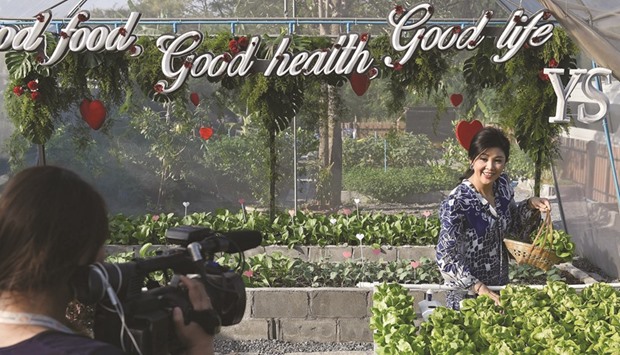Barred from discussing politics by the Thai junta, ousted prime minister Yingluck Shinawatra opened up her Bangkok home yesterday to talk about her new passion: vegetables.
Yingluck, Thailand’s first female premier, was removed from office by a court shortly before the May 2014 coup.
She has since been buffeted by travel restrictions, banned from politics and tangled up in a negligence case that carries a 10-year jail sentence.
That has limited to her to oblique references to the kingdom’s decade-old political crisis and she now attempts to keep in the public eye through Facebook updates and increasingly frequent publicity stunts.
Yesterday foreign media were invited for salad at her Bangkok compound where the smiling former premier gave a tour of her vegetable garden.
In a peculiarly Thai-style navigation of the curbs on her activities, she gently parried questions on politics in favour of urging her compatriots to eat more salad.
“I am very happy and proud of my salad garden,” she told bemused reporters, before offering the assembled press pack takeaways of homegrown lettuce.
As Yingluck strolled through the vegetable garden at her mansion in northern Bangkok, pausing to pick some lettuce for the cameras, she said it was a “simple get together” with no agenda.
But Kan Yuenyong, an analyst at the Siam Intelligence Unit think-tank, said the family was laying the groundwork for a 2017 election campaign.
“What is simpler than a Yingluck in her garden presenting herself as a housewife and one of the people?” he said.
However, she did briefly touch on politics, saying that a new military-scripted constitution must be carefully considered before it goes to a referendum in July.
“You will have to live with this constitution. So please make sure it fits with Thailand. It must be people-centric,” she said.
The kingdom has been torn by a decade-long struggle broadly between the Shinawatra family and their pro-democracy supporters, and the royalist Bangkok elite, which supports coups with its allies in the military and courts.
Despite her mounting woes, Yingluck remains a galvanising force among Shinawatra supporters and is still in Thailand – unlike her older brother Thaksin, a billionaire former premier who lives in self-exile to avoid jail in the kingdom.
She faces charges of negligence over a multi-billion-dollar rice subsidy scheme which paid farmers up to twice the market rate for their crop.
Critics say that the scheme cynically tapped state coffers to prop the Shinawatra’s political base, incubated corruption and resulted in massive rice stockpiles.
Yingluck denies wrongdoing, insisting that she was just trying to elevate the lot of the rural poor.
Shinawatra family members or their affiliates have won every Thai election since 2001, but have been bloodied by two coups in that time.
In a country where the military has banned political activity, the event was nothing if not political, said analysts, and an extension of a publicity campaign Thaksin and Yingluck are ramping up to reconnect with supporters.
The generals running the country have promised a 2017 election but critics, including political parties, fear that a military-backed draft constitution will weaken their influence and consolidate the military’s wide-ranging powers.
Yingluck said she spends her days tending to her vegetables, visiting temples and meeting friends.
She regularly speaks to her exiled brother Thaksin.
“We were taught to be close through good times and bad,” the former prime minister said.
Neither Shinawatra can run for office but they will likely boost any Puea Thai Party campaign.
“I think I can do more than watering plants,” said Yingluck.
Many analysts think Puea Thai Party will still win the next general election.
“Thaksin and Yingluck don’t have to do much,” said Siam Intelligence Unit’s Kan. “They just have to present themselves to the public and some might think that during the Shinawatra administration Thailand was more modern, especially compared to the current military administration which harks back to the 70s or 80s.”

FORMER
